Plants for summer pots
Petunias and pots have enjoyed a solid partnership for decades but today’s petunias are more pot perfect than ever. Thanks to extensive breeding we enjoy petunias with unprecedented weather resistance and flowering performance. The choice of varieties is vast, with colours and forms to suit every taste. Though dramatic enough to go it alone, petunias (and their smaller relatives, the calibrachoas) mix beautifully with other flowers.
Getting the best from petunias ...
- Petunias will flower in partial shade, but the more sun they see, the more they’ll flower.
- Well-drained soil or potting mix is essential.
- Although petunias are drought tolerant, they give their best with summer watering.
- Feed with slow release fertiliser or regular liquid feeding to maintain peak flowering performance.
- Most modern petunias don’t require much dead-heading, but occasional light trimming helps keep plants tidy and encourages further flowering.
Pelargoniums are famously tolerant of heat and drought. In Europe they have long rivalled petunias in popularity for pots and hanging baskets. They are very much back in fashion but today’s improved strains are far superior to the ones in Grandma’s garden. Cascading ivy-leafed pelargoniums look great in hanging baskets and window boxes. Upright forms make a colourful statement in large pots. Choose snowy white, classic red or one of many beautiful shades of pink, orange and lilac.
Verbenas flower in umbels - circular clusters of little flowers (florets). Modern verbena hybrids such as Superbena and Voodoo verbenas are substantially more mildew resistant that those of old, with neater growth habits and huge volumes of bloom. Many retain the cascading or trailing habit of their hanging basket heritage. Today’s heat tolerant varieties come in an expansive range of rich colours including some spectacular two-tone forms. They respond well to trimming, although an ability to ‘self clean’ means they stay looking tidy between trims.
Herbs like thyme, marjoram and sage, which come from dry Mediterranean climates, love growing in pots. Mix them together or combine them with colourful annuals. Soft herbs like parsley, basil and mint need plenty of water and enjoy shade from the hottest afternoon sun. Mint is a space robber, so giving it a large container of its own is a good idea. Bay trees and rosemary do well in large pots and take well to trimming.
Hostas are among the most adored foliage plants for shady parts of the garden. They grow well in pots. In fact, many gardeners prefer to grow them in pots, which can be placed around the garden, hidden among other plants. This way they can be moved from view for their winter dormant season or raised above soil that is too poorly drained. Container growing can also help to manage slugs and snails, which will ravage
a hosta as its young leaves unfurl in spring. Being deciduous, hostas are cold hardy and able to thrive in a wide range of climates, sprouting fresh leaves year after year. Colours range from bright chartreuse through forest greens, cool blues and silver greys plus many lovely variegated forms.
Hostas love:
- A cool shady location. They need some light for best leaf colour but protection from strong sun is important. Pale coloured hostas are the most prone to sunburn.
- Well-drained soil, rich in humus. Or good quality potting mix.
- Moisture. Summer watering is essential for new plantings. The more sun they get, the more water hostas need. Mulch to keep roots cool and moist.
- Fertiliser. Feed potted hostas in spring with controlled released fertiliser.
- Protection from the enemy. Make sure slug and snail protection is in place before spring leaves emerge.
Heucheras offer as much colour in their foliage as other plants have in their flowers. They prefer shade or part shade but, given plenty of moisture, the darker colours also do well in sun. Though tolerant of the odd dry spell heucheras thrive in moist, free- draining soil. Slow release fertiliser will give tired plants a new lease of life. Slugs and snails will generally leave heucheras alone but watch out for thrips in dry weather.
Sempervivums come from high alpine habitats so they’re totally cold hardy. Like all the smaller succulents, they make superb container plants. Rosettes multiply easily via offsets (baby rosettes) to form tight textural mats. There is enough variation of colour and pattern among the different sempervivum varieties to create a whole garden. Rosettes range in size as well as texture, some shiny and smooth, others hairy. Colours change with the seasons. Sempervivums grow best in bright light. Once a rosette has flowered, it usually dies away. New growth may quickly cover it, otherwise simply remove the dead rosette and replace it with a new offset or ‘pup’. Sempervivum (pronounced sem-per- veev-um) means ‘always alive’.
Daisies. Simple, sun-loving daisies are easy-going flowers that keep on flowering right though summer and beyond. Top for pots are: Federation daisies (Argyranthemum), Osteospermum, Gazania, Gerbera, Brachyscome, and Bracteantha paper daisies. Unlike straggly varieties of old, modern compact forms stay neat and tidy, but a trim and a feed after flowering will keep them going for longer.
Tip: raise pots closer to eye level on a wall, pedestal or table to maximise the enjoyment from colourful flowers and fragrance.

6-Dec-2018
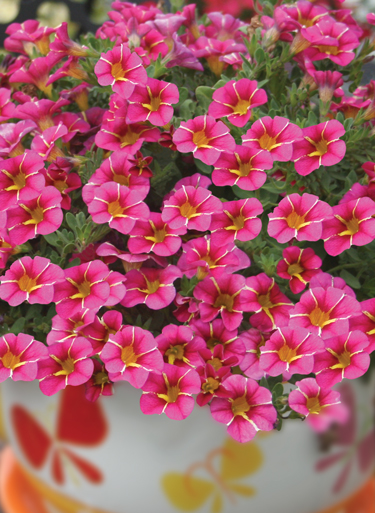
Petunia Superbells Cherry Star
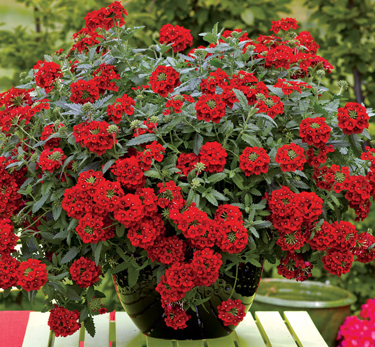
Verbena VooDoo
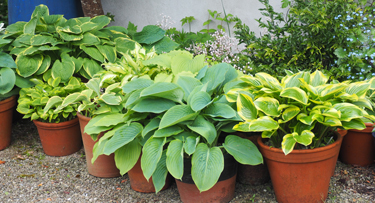
Hostas
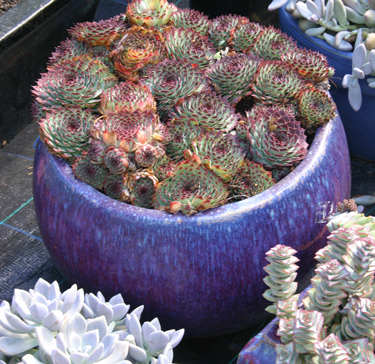
Sempervivums and succulents
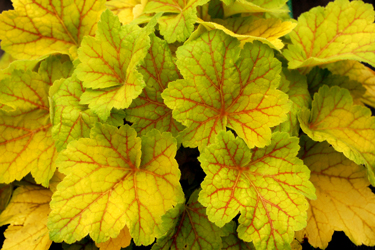
Heuchera 'Electra'
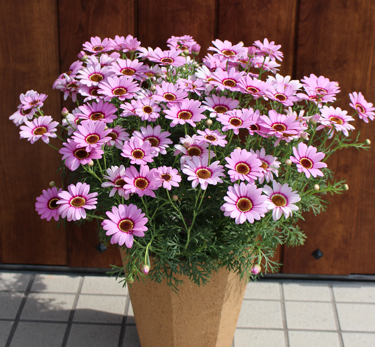
Bracteantha 'Dreamtime'

